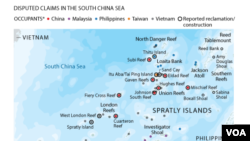According to a draft document of the ASEAN chairman's statement for the upcoming leaders summit in Kuala Lumpur, the group's views on disputes in the South China Sea will be little changed from last year.
The statement, given to VOA by a regional official who did not want to be named, again calls for peace, security, respect for international law and freedom of navigation in the highly trafficked waters. It also repeats ASEAN's call for a legally binding Code of Conduct.
Several ASEAN states have overlapping claims to the sea with China, notably Vietnam and the Philippines. Many in the regional group have advocated a multi-party solution to the problem, but Beijing has said it will only engage in bilateral talks over territorial disputes.
Malaysia, the current chair of ASEAN, will host the group's annual summit in Kuala Lumpur November 21, but typically many of the decisions announced from the summit are agreed upon ahead of time.
Kung Phoak, president of the Cambodian Institute for Strategic Studies, said the South China Sea dispute will take a lot of time to resolve, so a code of conduct in the meantime could help decrease tension.
“The main goal of [the code] is to prevent conflicts and armed disputes and to avoid the tension and instability which may be stepping up the conflict. So it is a common interest of ASEAN, China and other international partners such as the U.S.," he said. Cambodia has contributed much to peaceful solutions, he said.
However, John Ciorciari, a public policy professor at the University of Michigan, said ASEAN’s “consensus based diplomacy” makes it difficult to agree on a collective position regarding the South China Sea.
He said key ASEAN governments, besides Hanoi and Manila, need to demonstrate “the willingness to impose meaningful costs on Beijing. Even an ASEAN leaders’ statement criticizing China’s island building campaign probably would not stop the reclamation. Driving discussions back into diplomatic channels where compromise is possible will require convincing Chinese leaders that pressing ahead militarily will not serve their interests.”
Beijing's assertive moves in the South China Sea, especially an artificial island building spree in recent months, have led many to criticize China.
However, some ASEAN members, notably Cambodia, have been seen as unwilling to criticize China directly or join calls for multilateral talks on the disputes.
In addition to Vietnam and the Philippines, China also has competing South China Sea claims with Brunei, Malaysia and Indonesia.
This report was produced in collaboration with the VOA Khmer service.
